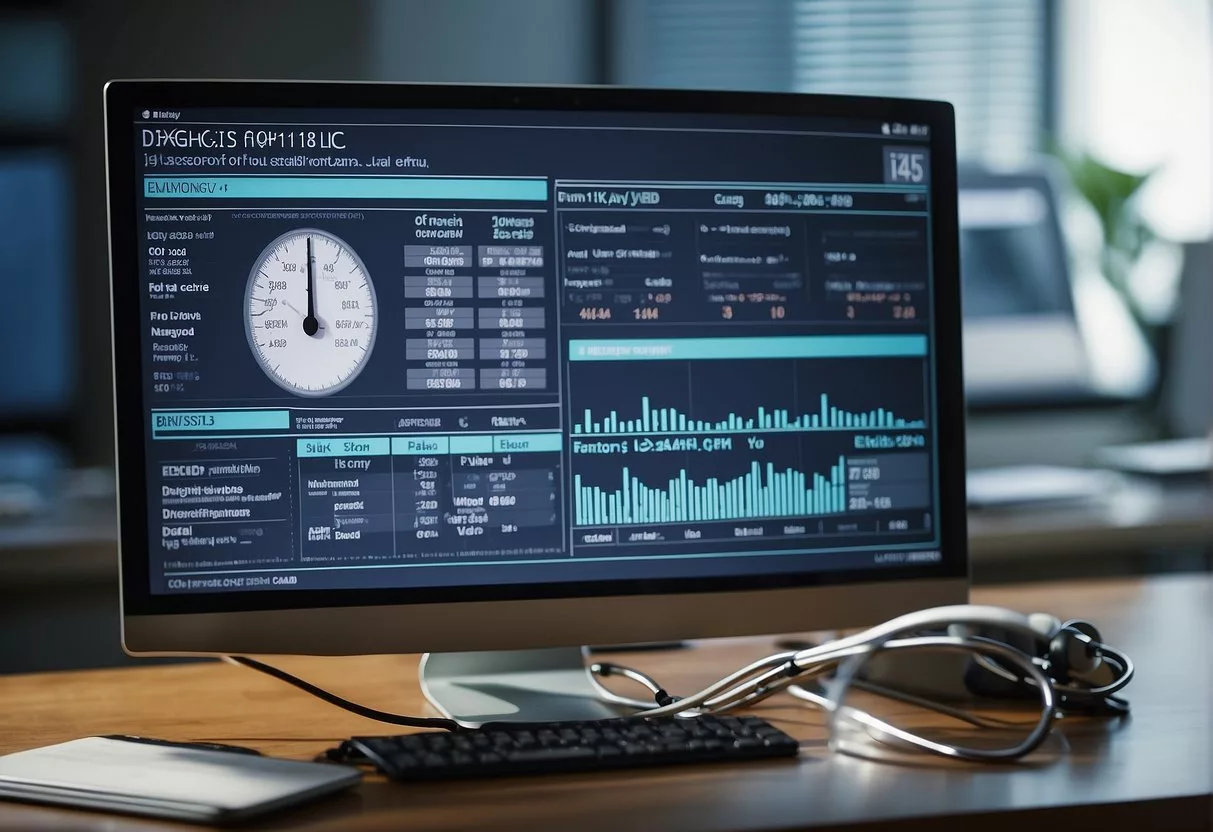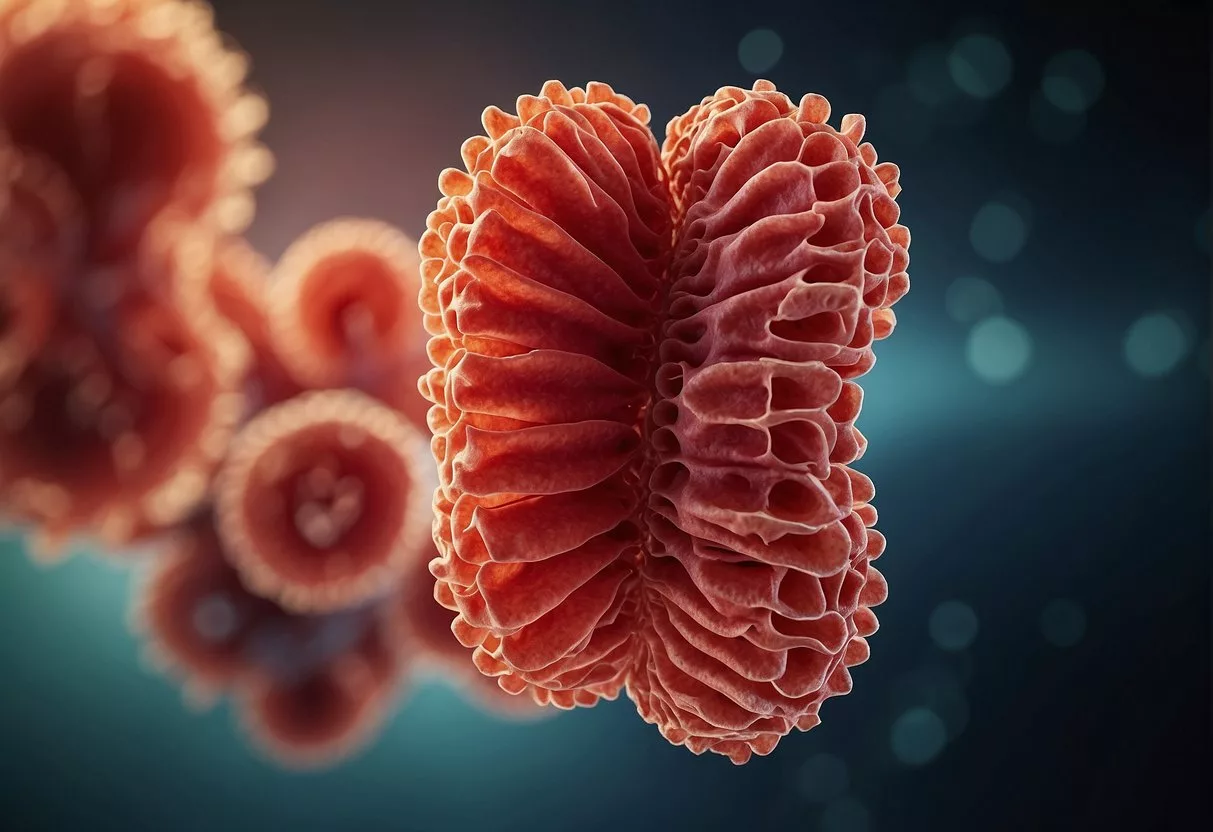Inflammatory bowel disease (IBD) is a chronic inflammation of the gastrointestinal tract. It is a term that describes two different conditions: Crohn’s disease and ulcerative colitis. Both conditions cause inflammation in the digestive system, which can lead to severe pain, diarrhea, and other symptoms.

Understanding IBD is important for those who suffer from it or know someone who does. The symptoms of IBD can vary greatly from person to person, and it can be difficult to diagnose. However, with proper diagnosis and treatment, people with IBD can manage their symptoms and live a full life.
IBD can be a challenging condition to live with, but it is possible to manage it with the right treatment and lifestyle changes. This article will explore what IBD is, its symptoms, diagnosis, complications, treatment, and management. It will also provide answers to some frequently asked questions about the condition.
Key Takeaways
- IBD is a chronic inflammation of the gastrointestinal tract that describes two different conditions: Crohn’s disease and ulcerative colitis.
- Symptoms of IBD can vary greatly from person to person, and it can be difficult to diagnose.
- With proper diagnosis and treatment, people with IBD can manage their symptoms and live a full life.
IBD Overview

Definition and Types
Inflammatory bowel disease (IBD) is a chronic inflammatory condition of the gastrointestinal (GI) tract. There are two main types of IBD: ulcerative colitis (UC) and Crohn’s disease (CD). UC is characterized by inflammation of the large intestine (colon) and rectum, while CD can affect any part of the GI tract from the mouth to the anus. Both UC and CD are associated with symptoms such as abdominal pain, diarrhea, and rectal bleeding.
Epidemiology
IBD is a global disease that affects people of all ages, but it is most commonly diagnosed in young adults. The incidence and prevalence of IBD are increasing worldwide, with the highest rates reported in Europe and North America. However, the incidence of IBD is also increasing in Asia, particularly in countries with a high level of economic development.
IBD affects both men and women equally, and there is a higher incidence of IBD in white people compared to other ethnic groups. The incidence of IBD is also higher in urban areas compared to rural areas.
Pathogenesis
The exact cause of IBD is unknown, but it is thought to be a result of an abnormal immune response to environmental factors in genetically susceptible individuals. There is a strong genetic component to IBD, with over 200 genes associated with the disease.
Environmental factors such as diet, smoking, and microbial exposure have also been implicated in the pathogenesis of IBD. The inflammatory response in IBD is characterized by the infiltration of immune cells into the intestinal mucosa, resulting in tissue damage and ulceration.
In conclusion, IBD is a chronic inflammatory condition of the GI tract that affects people of all ages. The incidence and prevalence of IBD are increasing worldwide, with the highest rates reported in Europe and North America. The pathogenesis of IBD is complex and involves both genetic and environmental factors.
Symptoms of IBD

Symptoms of IBD can vary depending on the type of disease and severity of the inflammation.
Common Symptoms
The most common symptoms of IBD include abdominal pain, diarrhea, and weight loss. Abdominal pain is usually felt in the lower abdomen and can range from mild to severe. Diarrhea is often chronic and can be accompanied by blood or mucus in the stool. Weight loss is usually due to a loss of appetite and malabsorption of nutrients.
In addition to these common symptoms, fatigue is also a common complaint among IBD patients. This is often due to the body’s immune response to the inflammation. Rectal bleeding and anemia can also occur in patients with IBD, especially in those with ulcerative colitis.
Associated Conditions
In addition to the common symptoms, IBD can also be associated with a number of other conditions. Arthritis is a common condition that can occur in patients with IBD. Uveitis, a type of eye inflammation, can also occur in some patients. Primary sclerosing cholangitis, a condition that affects the bile ducts in the liver, is also associated with IBD.
Skin conditions such as erythema nodosum and pyoderma gangrenosum can also occur in patients with IBD. Kidney disease and gallstones are other conditions that have been associated with IBD.
It is important to note that not all patients with IBD will experience all of these symptoms or associated conditions. If you are experiencing any symptoms of IBD, it is important to speak with your healthcare provider for an accurate diagnosis and appropriate treatment.
Diagnosis of IBD

Diagnostic Procedures
There are several diagnostic procedures that can be used to diagnose IBD. These procedures include colonoscopy, endoscopy, biopsies, blood tests, and computed tomography (CT) scans.
A colonoscopy is a procedure that allows a doctor to examine the entire colon using a flexible tube with a camera on the end. This procedure can help to identify any inflammation or ulcers in the colon, which are common symptoms of IBD.
Endoscopy is another procedure that can be used to diagnose IBD. This procedure involves inserting a small camera into the digestive tract to examine the lining of the stomach and small intestine. Like colonoscopy, endoscopy can identify inflammation or ulcers in the digestive tract.
Biopsies may also be taken during a colonoscopy or endoscopy. A biopsy involves taking a small sample of tissue from the digestive tract for analysis. This can help to identify any abnormal cells or inflammation that may be present.
Blood tests can also be used to diagnose IBD. These tests can measure the levels of certain proteins in the blood that are associated with inflammation. High levels of these proteins can indicate the presence of IBD. Typical lab tests used in the diagnosis and management of IBD are:
- Complete Blood Count (CBC): Helps detect anemia (a common condition in people with IBD due to bleeding) and infection.
- C-Reactive Protein (CRP): A marker of inflammation. High levels can indicate active inflammation in the body, including in the intestines.
- Erythrocyte Sedimentation Rate (ESR): Another test that measures inflammation. Like CRP, a high ESR might indicate inflammation, although it’s not specific to any particular cause.
- Albumin and Total Protein: These tests can check for protein loss and nutritional status, which can be affected in people with IBD.
- Liver Function Tests: IBD can sometimes affect the liver. Tests like alkaline phosphatase (ALP), alanine transaminase (ALT), aspartate transaminase (AST), and bilirubin can help evaluate liver health.
- Fecal Calprotectin or Fecal Lactoferrin: Though not blood tests, these stool tests are worth mentioning as they are non-invasive markers of intestinal inflammation, helping to distinguish between IBD and irritable bowel syndrome (IBS).
- Vitamin and Mineral Levels: Tests for iron, vitamin B12, folic acid, vitamin D, and others can identify deficiencies common in IBD.
- Autoantibody Tests: Including Anti-Saccharomyces Cerevisiae Antibodies (ASCA) and perinuclear anti-neutrophil cytoplasmic antibodies (pANCA), which can help differentiate between Crohn’s disease and ulcerative colitis in some cases.
Computed tomography (CT) scans can also be used to diagnose IBD. These scans use X-rays and computer technology to create detailed images of the digestive tract. CT scans can help to identify any inflammation or other abnormalities in the digestive tract.
Screening and Monitoring
Screening for IBD is important, especially for individuals who have a family history of the disease. Calprotectin, a protein found in stool samples, can be used as a screening tool for IBD. Elevated levels of calprotectin can indicate the presence of inflammation in the digestive tract.
Monitoring for colon cancer is also important for individuals with IBD. People with IBD have an increased risk of developing colon cancer, so regular screening is recommended. Screening may involve colonoscopy, stool tests, or other diagnostic procedures.
Overall, early diagnosis and treatment of IBD is important for managing symptoms and reducing the risk of complications. If you are experiencing symptoms of IBD, such as abdominal pain, diarrhea, or rectal bleeding, it is important to see a doctor for evaluation and diagnosis.
Complications of IBD

Inflammatory bowel disease (IBD) is a chronic condition that can lead to various complications. These complications can be acute or long-term and affect different parts of the body.
Acute Complications
Acute complications of IBD can be severe and require immediate medical attention. Some of the acute complications of IBD include:
- Toxic megacolon: This is a rare but life-threatening complication of IBD, where the colon becomes dilated and paralyzed, leading to a risk of perforation and sepsis.
- Bowel obstruction: Inflammation and scarring can cause narrowing of the intestine, leading to bowel obstruction. Symptoms of bowel obstruction include abdominal pain, bloating, and vomiting.
- Abscesses: Inflammation can lead to the formation of abscesses, which are pockets of pus. Abscesses can occur in different parts of the body, including the abdomen, pelvis, and anus.
- Fistulas: Fistulas are abnormal connections between different parts of the intestine or between the intestine and other organs. Fistulas can cause pain, bleeding, and infection.
- Blood clots: IBD increases the risk of blood clots, which can lead to deep vein thrombosis (DVT) or pulmonary embolism (PE).
Long-Term Complications
Long-term complications of IBD can develop over time and affect the quality of life of patients. Some of the long-term complications of IBD include:
- Chronic inflammation: Chronic inflammation can lead to tissue damage and scarring, which can cause bowel obstruction and other complications.
- Colorectal cancer (CRC): Patients with IBD have an increased risk of developing colorectal cancer, especially if they have had the condition for a long time. Specifically, for ulcerative colitis, the relative risk of CRC has been reported in various studies to range approximately from 2 to 2.5 times higher than that of the general population.
However, in patients with extensive colitis (where the disease affects the entire colon), the risk can be even higher, with some studies suggesting a risk increase of up to 10 to 15 times that of the general population over a patient’s lifetime.
For Crohn’s disease affecting the colon, the relative risk of CRC is also elevated, similar to that in ulcerative colitis, especially in patients with long-standing and extensive disease.
- Malnutrition: Chronic inflammation and poor absorption of nutrients can lead to malnutrition, which can cause weakness, fatigue, and other symptoms.
- Dehydration: Persistent diarrhea and poor absorption of fluids can lead to dehydration, which can cause weakness, fatigue, and other symptoms.
- Persistent diarrhea: IBD can cause persistent diarrhea, which can lead to dehydration and malnutrition.
In conclusion, IBD is a chronic condition that can lead to various complications. Patients with IBD should be aware of these complications and seek medical attention if they experience any symptoms. Regular monitoring and management of the condition can help prevent or reduce the risk of complications.
Treatment and Management
There are several treatment options available for managing inflammatory bowel disease (IBD). The goal of treatment is to reduce inflammation, relieve symptoms, and prevent complications. The treatment plan may vary depending on the severity of the condition and the patient’s response to treatment.
Medication Options
Medications are often the first line of treatment for IBD. There are several types of medications available to manage the symptoms of IBD. Corticosteroids, such as prednisone, are used to reduce inflammation and suppress the immune system. Immunomodulators, such as azathioprine and methotrexate, are used to suppress the immune system and reduce inflammation. Biologics, such as infliximab and adalimumab, are used to block specific proteins that cause inflammation.
Anti-inflammatory medications, such as 5-aminosalicylates, are used to reduce inflammation in the digestive tract. Antibiotics may also be prescribed to treat infections that can occur with IBD.
Surgical Interventions
Surgery may be necessary if medications are not effective or if complications arise. Resection and strictureplasty are common surgeries used to treat IBD. Resection involves removing the affected part of the intestine, while strictureplasty involves widening a narrowed section of the intestine.
In some cases, surgeries may be used to create an ostomy, which involves creating an opening in the abdomen for waste to pass through. There are several types of ostomies, including ileostomy and colostomy.
Lifestyle and Diet
In addition to medication and surgery, lifestyle changes and dietary modifications may help manage IBD symptoms. Smoking has been shown to worsen IBD symptoms, so quitting smoking is recommended. Stress management techniques, such as meditation and yoga, may also help manage symptoms.
Dietary modifications may include avoiding foods that trigger symptoms, such as spicy or fatty foods. A low-fiber diet may be recommended during a flare-up, while a high-fiber diet may be recommended during remission. Some patients may benefit from a specific carbohydrate diet or a low FODMAP diet.
Overall, the treatment plan for IBD should be tailored to the individual patient and may involve a combination of medication, surgery, lifestyle changes, and dietary modifications. Close monitoring and regular follow-up with a healthcare provider are important for managing IBD.
Prevention of IBD
Preventing the initial onset of Inflammatory Bowel Disease (IBD), which includes conditions such as Crohn’s disease and ulcerative colitis, is challenging due to its unclear etiology. However, there are strategies to prevent complications, manage symptoms, and potentially influence the course of the disease. Here are some preventive measures and lifestyle modifications that can help manage IBD and improve quality of life:
1. Diet and Nutrition
- Dietary Adjustments: Although no specific diet prevents IBD, certain foods may trigger symptoms in some individuals. Keeping a food diary can help identify and eliminate these triggers.
- Nutrient-Rich Foods: Focus on a balanced diet rich in fruits, vegetables, lean proteins, and whole grains, while being mindful of any personal food sensitivities.
- Hydration: Stay well-hydrated, especially during flare-ups, to replace fluids lost through diarrhea.
2. Medication Adherence
- Consistent Medication Use: Follow prescribed treatments rigorously. Medications can help reduce inflammation, maintain remission, and prevent complications.
- Regular Medical Reviews: Regular check-ins with a healthcare provider ensure that the treatment plan remains effective and is adjusted as needed.
3. Lifestyle Modifications
- Quit Smoking: Smoking is linked to an increased risk of Crohn’s disease and can exacerbate the disease course. Quitting smoking can significantly benefit overall health and potentially improve IBD symptoms.
- Stress Management: Stress doesn’t cause IBD but can trigger flare-ups. Techniques such as meditation, yoga, and regular exercise can help manage stress levels.
4. Regular Health Monitoring
- Surveillance Colonoscopy: Regular screenings can detect changes in the colon that might indicate cancer or precancerous states, especially important for individuals with a long history of IBD.
- Vaccinations: Stay up to date with vaccinations, as some medications for IBD may weaken the immune system.
5. Exercise
- Regular Physical Activity: Exercise can help reduce stress, maintain a healthy weight, and improve overall well-being. Tailor the intensity of the workout to your current health status and capabilities.
6. Avoid Nonsteroidal Anti-inflammatory Drugs (NSAIDs)
- NSAID Caution: Medications like ibuprofen and naproxen can worsen IBD symptoms and should be used cautiously or avoided.
7. Supplements and Probiotics
- Consultation Recommended: Speak with a healthcare provider before starting any new supplements or probiotics to ensure they are safe and potentially beneficial for your condition.
Living with IBD

Living with inflammatory bowel disease (IBD) can be challenging, but it is possible to manage symptoms and lead a fulfilling life. Daily life considerations for people with IBD include managing flare-ups, achieving remission, and dealing with hospitalization when necessary.
Daily Life Considerations
Flare-ups are a common occurrence for people with IBD. During a flare-up, symptoms such as abdominal pain, diarrhea, and fatigue can become more severe. It is important for people with IBD to be aware of their triggers and take steps to avoid them. This may include changes in diet, stress reduction techniques, or medication adjustments.
Achieving remission is the ultimate goal for people with IBD. This means that symptoms are under control, and the person can lead a relatively normal life. It is important to work closely with a healthcare provider to develop a treatment plan that is effective in achieving and maintaining remission.
Hospitalization may be necessary for people with IBD, especially during a severe flare-up or complications such as bowel obstruction or abscess. It is important to have a support system in place, including family, friends, and healthcare providers, to help manage hospital stays and recovery.
Psychosocial Impacts
Living with IBD can also have psychosocial impacts, including anxiety, depression, and communication challenges. It is important for people with IBD to prioritize their mental health and seek support when needed. This may include therapy, support groups, or medication.
Communication is also important for people with IBD, especially when it comes to discussing symptoms with healthcare providers and loved ones. It can be helpful to keep a symptom diary and bring it to appointments, as well as practice open and honest communication with loved ones.
Overall, managing IBD can have a significant impact on quality of life. However, with proper treatment and support, it is possible to lead a fulfilling life despite the challenges.
Frequently Asked Questions

What are the primary symptoms of inflammatory bowel disease?
The primary symptoms of inflammatory bowel disease (IBD) include abdominal pain, diarrhea, and rectal bleeding. Other common symptoms include weight loss, fatigue, and fever. The severity of these symptoms can vary from person to person and can also depend on the type of IBD a person has.
How is inflammatory bowel disease diagnosed?
Inflammatory bowel disease is typically diagnosed through a combination of medical history, physical examination, and laboratory tests. These tests may include blood tests, stool tests, endoscopy, and imaging tests such as CT scans or X-rays.
What dietary changes can help manage inflammatory bowel disease?
Dietary changes can play an important role in managing inflammatory bowel disease. Some people with IBD find that certain foods can trigger symptoms, such as dairy products or high-fiber foods. Others may benefit from a low-residue diet, which limits the amount of fiber and other indigestible materials in the diet. It is important for people with IBD to work with a registered dietitian to develop a personalized nutrition plan.
Are there differences in IBD symptoms between genders?
There is some evidence to suggest that women with IBD may experience more severe symptoms during certain phases of their menstrual cycle. Additionally, women with IBD who become pregnant may experience a temporary improvement in symptoms during pregnancy, but may also experience a flare-up after giving birth.
What treatments are available for inflammatory bowel disease?
Treatment for inflammatory bowel disease may include medication, surgery, or a combination of both. Medications used to treat IBD can include anti-inflammatory drugs, immunosuppressants, and biologic therapies. In some cases, surgery may be necessary to remove damaged portions of the intestine.
Can inflammatory bowel disease be cured or is it a chronic condition?
Inflammatory bowel disease is a chronic condition, which means that there is currently no cure. However, with proper treatment and management, many people with IBD are able to achieve long-term remission and lead full, active lives.
cardiovascular health, inflammation, lose weight, mental wellbeing, pain, sauna, sauna health benefits
CCMS, culinary medicine, diet in chronic diseases, nutrient intake optimization, nutrition, obesity, prevention, type 2 diabetes
alcohol, ALT, AST, fatty liver disease, hepatitis, journey, LFT, liver enzymes, liver function tests